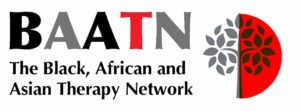Authors: Susan Groves and Syed Azmatullah
 Susan is a member of BAATN and a practising Core Process Psychotherapist. She is based in Birmingham having lived most of her life in South Africa.
Susan is a member of BAATN and a practising Core Process Psychotherapist. She is based in Birmingham having lived most of her life in South Africa.
Azmat is a practising Core Process Psychotherapist and is serving as co-chair of their association’s ethics committee and is co-chair of UKCP’s HIPC Ethics, Diversity and Intersectionality committee. He practices in Brighton.
“I sent Syed Azmatullah, a UKCP colleague, the draft of this article. He responded to it so beautifully I’ve woven his response into the article.” – Susan
SG I solemnly pledge to serve humanity.
This was the opening phrase of a declaration read by health science graduates at a recent graduation ceremony in Cape Town, South Africa[1]. (One of my sisters was graduating, hence my awareness of this.)
The following phrase was
My most important considerations will be the health of patients and the health of their communities.
What I so appreciate about this is that it is not regarding ethical practice as being just about ‘me and my client’.
SA I love Sunday mornings, particularly sunny ones, when the world seems to be awakening into a calmer space, ideal for quiet contemplation and resting into reflective pieces of work such as the one you have kindly sent to me.
Personally I love the reference to Cape Town conjuring up the freshness of the breeze emerging over the Benguela current coming up from the cool southern waters as it begins inter- mingling with the Agulhas current’s warmer waters of the Indian Ocean round to the north. There is something for me in these currents and East meets West echoed in your writing.
SG I looked at the ethical code of the UK Council for Psychotherapy, of which I am a member, to see what it had to say about the responsibility of the therapist to the broader society. The 2019 UKCP Code of Ethics and Professional Practice[2] states, early in the document, that the practitioner must
not harm or collude in the harming of your client or the clients of others[3].
Later the same document under Social responsibility it states that the practitioner must
Actively consider issues of diversity and equalities as these affect all aspects of your work and acknowledge the need for a continuing process of self-enquiry and professional development[4].
SA I like the way you begin with the solemn pledge of health professionals echoing the Hippocratic Oath. As you enlarge on this and draw in the UKCP approach to ethics it does seem more based around individuals but importantly draws in consideration of diversity.
SG I then looked at what my own professional association – the Association of Core Process Psychotherapists – had to say on the matter in their document entitled ‘Ethical principles and code of professional conduct for Psychotherapists (2017)[5]. Under Fundamental Values it states:
Members … are committed to co-enquire with clients into the mutual nature of suffering, and into the cultivation of well-being as it resides in every aspect of experience and life. They seek to be mindful of the interconnected nature of relationship, and to explore an inclusive awareness of social, cultural, ecological and universal relationship[6].
Its section on Diversity and Equality states that
Members … seek to provide a framework … that allows different and diverse ideas and perspectives on what it means to be human to be considered, respected and valued[7].
And in the section on Conduct, that
Each member strives … to explore … the nature of ethical relationship in its individual and collective form[8].
In the West we are brought up with a very ‘individual’ ethos and it takes, I find, conscious and deliberate effort to move away from this.
SA The ACPP quotes convey a different flavour in that they seem to have interconnection between us all in society and also through ecology the environment. It seems to be coming from a substantially different mindset and you mention this by naming the West and I wondered if stating something around the ACPP mindset being influenced by the East (e.g. Buddhist Dependent Origination) might emphasise the different ‘current’.
SG I’d like us to look again at our ethical frameworks and ask the following questions:
- Do they include enough in terms of what it means to be an ethical practitioner in the world in 2020?
- What needs to be foregrounded more to reflect a more appropriate practice of psychotherapy in our time?
And, most interestingly for me,
- Might we together draft a simple declaration – in the nature of the one I referred to in the beginning of this piece – that can guide us and that we can return to – perhaps annually – to pledge our commitment and action towards healing our planet and our world.
AND SAY IT OUT LOUD!
SA I like your questions and challenge at the end. This seems most pertinent at the moment and it would be wonderful if such a simple declaration could emerge from a contemplative mini-retreat giving this space and time and reflection so that it has the potential to be a simple oath worthy of our 21st century inter-connected, inter-dependent complex world as it moves towards an uncertain future. Which current will we follow or will we benefit from an inter-mingling?
References:
[1] See this link for the whole declaration.
[2] The link to this on the UKCP website is https://www.psychotherapy.org.uk/wp-content/uploads/2019/06/UKCP-Code-of-Ethics-and-Professional-Practice-2019.pdf
[3] Pg 1:6.
[4] Pg 4:29.
[5] For the full text see the home page of www.acpponline.net.
[6] Pg 2:3.1.
[7] Pg 4:4.2
[8] Pg 7:6.1.
